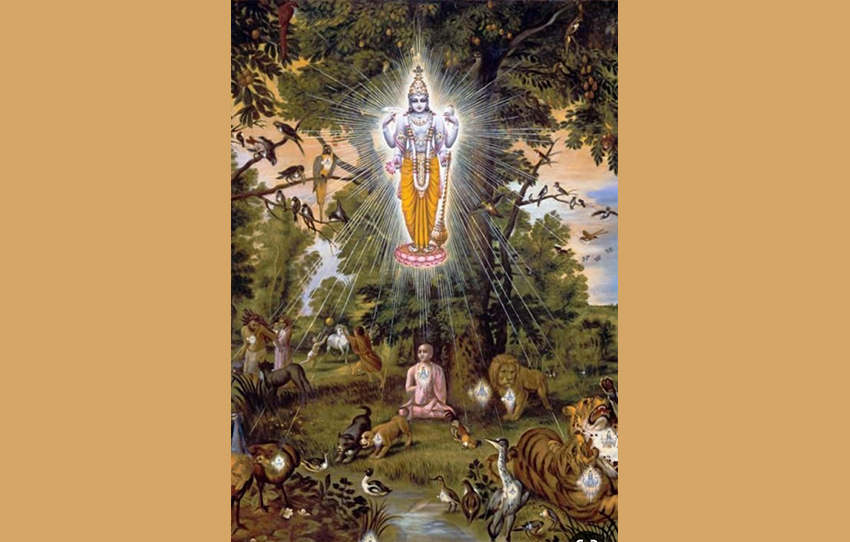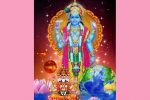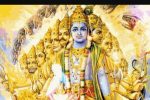NAME 45
Dhātṛuruttamaḥ धातृरुत्तमः
The discussion of the supporting aspect of the Brahman is being continued. Dhātṛ means the One who personifies creation and uttama means the Supreme. Therefore, this nāma refers Him as the Supreme personifier of creation. How He personifies the creation? Personification happens through dhātu-s. There are seven layers or substratum in human body known as dhātu-s. They are chyle, blood, flesh, fat, bone, marrow, procreative fluids and skin.
He is the cause of creation of these dhātu-s. The Ultimate support of every thing.
The explanation is given based on the word dhaatu, which means – fundamental element or basic constituent. He is the ultimate constituent of all, and so He is dhaaturuttamah.
Sri Adi Sankara treats this as 2 different Namas – Dhaatuh and Uttamah. Dhaatuh means the fundamental building block of the Universe. Uttamah means the highest power of the Universe.
Dhaatur-uttamah
the fundamentals (“dhaatu”) that form the reinforcement on any existent thing are called Dhaatu. In science of life, as explored by the Rishis, all corporal forms have risen form and exist as composed of some definite ‘elemental factor’ called the Dhaatus. Of the end less varieties of Dhaatus available in existence, the subtlest Dhaatu, without which no existence, is ever possible, is the chit Dhaatu, and this is the Dhaatu-ruttamah. Though very rarely, we do find some commentators splitting this word into two as Dhaatu and uttama. But in the majority of the cases we find it taken to form one term and explained as ‘the subtlest of the Dhaatus’.
४५. ॐ धातुरुत्तमाय नमः।
45. Om Dhaturuttamaay Namah
The Lord Who is Greater than the Creator (Brahma)
Dhaatur-uttamah –the fundamentals (“dhaatu”) that form the reinforcement on any existent thing are called Dhaatu. In science of life, as explored by the Rishis, all corporal forms have risen form and exist as composed of some definite ‘elemental factor’ called the Dhaatus. Of the end less varieties of Dhaatus available in existence, the subtlest Dhaatu, without which no existence, is ever possible, is the chit Dhaatu, and this is the Dhaatu-ruttamah.
Though very rarely, we do find some commentators splitting this word into two as Dhaatu and uttama. But in the majority of the cases we find it taken to form one term and explained as ‘the subtlest of the Dhaatus’.
INTERPRETRATION GUIDED BY SANT VANI (WORDS OF SAINTS)
Dhāturuttamaḥ
The exalted sustainer.
The supreme ‘essence’ and the best among the fundamental elements of life.
The words dhātu and uttama are generally taken together as one nāma. It is linked with a sandhi.
Again the word dhātu can be taken in two ways.
Dhadhāti, that which sustains is dhātu or dhātā. Brahmāji, is called dhātā, because He has created this world. So, Parameśvara is dhātuḥuttamaḥ–is utkṛṣṭa, superior to Brahmāji also, being the creator of everything and also the creator of Brahmāji, the creator.
The basic materials that go to make up something and thereby support and sustain it, are also known as dhātu. Thus, the five elements li e the pṛithivī, vayū, agni and so on are dhātus; The things that constitute the body – blood, bones, flesh, marrow, fat, tissues, nerves and the other things are all dhātus. Everything in the prapañca, universe, both in the form of kāraṇa and kārya (cause and effect), is sustained by the cit, the consciousness. Therefore, as consciousness, He is sarva-dhātubhyaḥuttamaḥ, superior to all the dhātus.
From another standpoint, Dhātu also stands for a root, the main building block, in Sanskrit language. By adding different prefixes and suffixes, millions of words can be formed in Sanskrit.
As is common with Sanskrit words, the word Dhātu has several other meaning and contextual interpretations as well:
Dhātu is also a name for ‘metal’ in Rasaśāstra – then the Supreme being could be seen as the best (uttamaḥ) among the metals in the Universe
Ayurveda recognizes 7 types of Dhātus or ‘nourishing/supporting tissues in the body:
Rasa (‘chyle’, ‘lymph’ or ‘plasma’),
Rakta (‘blood’),
Māṃsa (‘muscles’ or ‘flesh’),
Meda (‘fat’ or ‘adipose’),
Asthi (‘bone’),
Majjā (‘marrow’ or ‘nervous system’),
Śukra (‘semen’ or ‘reproductive tissue’)
The essence of these 7 Dhātus is called “ojas” and has the power to bestow immunity and protection against diseases – of the Dhātusojas is the most uttamaḥ.
In Śhilpaśāstra, the key minerals and essential materials used to make the Vigraha/Murti (icon) of the deity are called Dhātus and of these ‘he’ is uttamaḥ. One could go on listing the various ways in which this name could be interpreted.
Dhātu also refers to the essence/essential ingredient in ayurvedic herbs/medicines. This meaning has great practical application in day-to-day living. The “name” of the supreme being is a great medicine for everyone at all times – at times of great strife or even during the good times – these names are not simply names but deeply significant mantras that are numinous (divine) in their sound and imbibed with deep spiritual Śaktī that can transform us from within and steady the wandering mind and bring it to single-pointed focus. Each of these names come from the mind of a great Drāṣṭa (literally a seer) – sages who during deep meditation saw these names in their mind’s eye as representative of the divine supreme being and charged with his power (Śaktī) – this is the essence of “mantra-sādhana“.
He is Dhātu, being in the form of cit, that is, the adhiṣṭhānacaitanya, which is the reality of everything. Anything that has something special is utkṛṣṭa, exalted. The various devatās like Brahmāji and so on are exalted beings. But, He is utkṛṣṭatama, the most exalted. The two names, they are taken together as one name. Dhātu is consciousness, the basic reality which sustains everything and Uttama means the most exalted.
In one of the earlier names, the supreme being was referred to as Bhutakrd, meaning “that” which has become all that we see in the Universe including the 5 principle-elements: Prthvi (Earth), Apa (Water), Agni/Tejas (Fire), Vayu (Air), Akasa (Infinite Space/Ether). Here this name is being further qualified – He is the very essence of all and superior to all other Dhātus – As the sustaining and organizing principle of the Universe, he has to be superior to and the essence of all the fundamental principles.
With this name, the 5th couplet containing 9 ‘beads’ of the Vishnu Sahasranama is completed.



